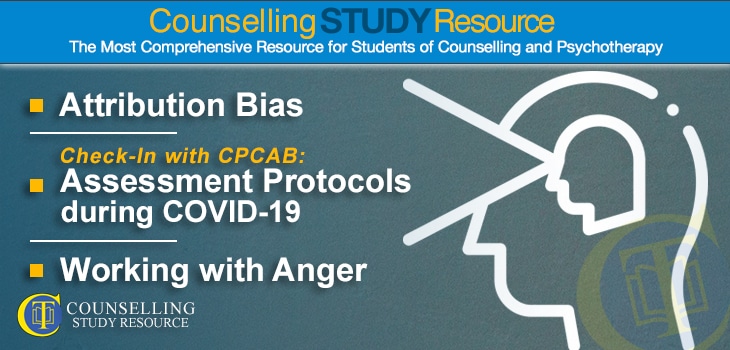153 - Attribution Bias and How It Matters in Counselling
Assessment Protocols during COVID-19 Period - Preparing to Work with Anger
In episode 153 of the Counselling Tutor Podcast, Ken Kelly and Rory Lees-Oakes delve into the psychological theory of attribution bias. 'Check-In with CPCAB' then looks at how assessment will be carried out this year, given that in-person exams cannot take place due to the COVID-19 situation. Last, in 'Practice Matters', the presenters explore working with anger in the counselling room.
Attribution Bias and How It Matters in Counselling (starts at 1.55 mins)
'Attribution' in psychology refers to how people explain other people's behaviours and choices.
For example, dispositional bias looks on how humans will often decide an individual is a certain 'type of person' and will then look for evidence to support this, rather than seeing them more fully and keeping an open mind as to why they are behaving in a particular way.
Attribution bias is more prevalent in individualistic (as opposed to collective) societies, where each person is seen as having a unique personality and as being responsible for themselves.
The concept matters to counselling as it is intrinsically connected with the importance of having unconditional positive regard for clients, and to attending with empathy to each client's experiencing of the world.
Self-awareness in the counsellor is key to ensuring that attribution bias does not creep into our work with clients.
Rory has written a handout on this topic, presenting a short case study on how attributional bias could impact on the client-counsellor relationship. You can access this here.
Rory challenges listeners to watch how others use attributional bias, as a good way to practise your own vigilance for this.
Check-In with CPCAB: Assessment Protocols during COVID-19 Period (starts at 13.30 mins)
Rory talks to Heather Price (Senior Counselling Professional) at CPCAB (Counselling & Psychotherapy Central Awarding Body) about how assessment will be carried out this year, given that students can no longer attend face-to-face training or in-person exams.
Heather explains that it has taken some time to be able to provide full information on how assessment will be done this year due to the need for this to be approved first by Ofqual. She explains that this approval process is now complete.
For students on Level 2 and Level 3 courses, results will be calculated based on the evidence already gathered by tutors.
And for Levels 5 and 6, there is no change as these courses are always assessed by a case review written at home (i.e. not under exam conditions).
Assessing Level 4 is more complex, as this is the level at which students become qualified practitioners, so CPCAB has a responsibility to ensure that those who pass are fit to practise professionally, and that there is equity in the standard required across the country.
The method that has been developed - as an alternative to the 30-minute recording and two-hour written paper - is a case review. Heather explains the way this must be structured, and the mark scheme.
If you are a CPCAB student and have any questions about your course assessment, then please ask your tutor rather than contacting CPCAB directly.
Tutors are then able to access CPCAB directly to answer any queries. You can also find more information on the CPCAB website.
This segment is sponsored by CPCAB, the UK's only awarding body run by counsellors for counsellors.
Preparing to Work with Anger (starts at 28.00 mins)
In this part of the Counselling Tutor Podcast - aimed at supporting qualified practitioners to sharpen their competence - Rory and Ken talk about working with anger, an important topic on which Rory has recently recorded a lecture.
Anger is often conflated in people's minds with violence, but this is not necessarily so.
Indeed, anger can be used in very positive ways, for example to bring about important changes in the world.
Anger is, however, an emotion that many counsellors dislike working with - this highlights the importance of looking at how we feel in the presence of other people's anger as part of our personal development work, so that we can develop our own self-awareness and learn to be able to sit with clients' anger (so long, of course, that this does not jeopardise our own safety).
Anger is a base emotion - in other words, it is an innate emotion that is natural to all humans.
It is therefore important not to banish it from the therapy room, but instead to learn how to welcome it into the room while also setting appropriate boundaries.
Rory's lecture looks at:
- the difference between rage and anger
- what drives anger
- how we can work with anger therapeutically
- how therapists can engage with anger in the service of the client
- interesting facts and research relating to anger.


